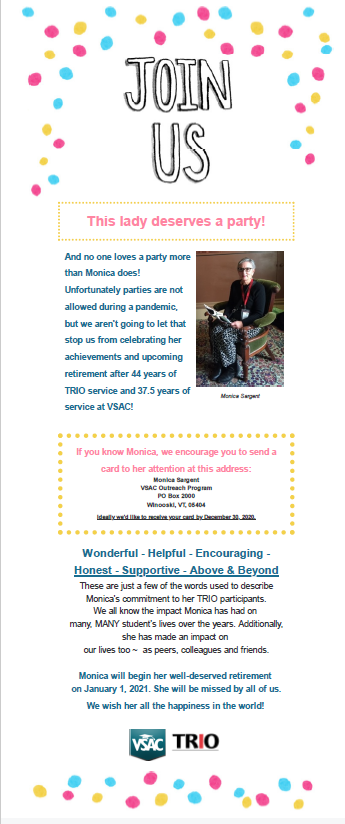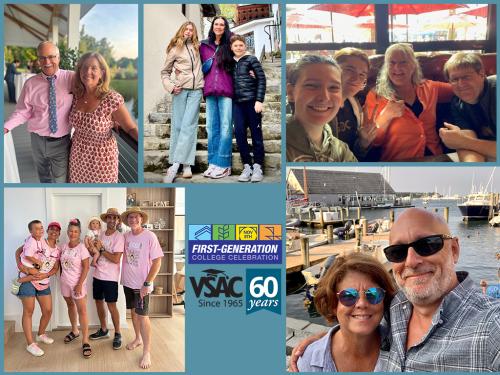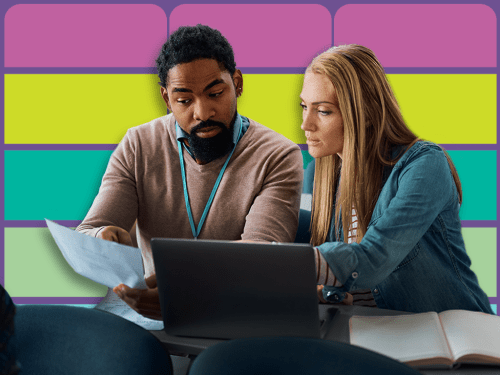VSAC will be closed Monday, February 16, 2026 in observance of Presidents’ Day.
Celebrating Monica Sargent: 44 years, more than 7,000 lives touched
Monica Sargent is a native Vermonter who grew up in Johnson, the fourth generation of her family to do so. She was the fifth of six children of parents who worked in the talc and woolen industries in town. Her older siblings preceded her in college attendance, two earning associate degrees, one from Champlain College and one from Vermont Technical College, and two earning bachelor’s degrees, one from the University of Vermont and one from Johnson State College.
Monica and her younger sister followed their older sister to Johnson State (now Northern Vermont University, Johnson campus), all preparing to be teachers.
While an undergraduate at Johnson, Monica held a work-study position with the newly funded Student Support Service TRIO program called PROVE.
The rest, as they say, is history.
 Monica has dedicated her career to helping students find better lives. She is retiring from VSAC after counseling students for 37 years. But before that, she was an assistant teacher in the summer college transition program and a writing tutor to her peers during the academic year.
Monica has dedicated her career to helping students find better lives. She is retiring from VSAC after counseling students for 37 years. But before that, she was an assistant teacher in the summer college transition program and a writing tutor to her peers during the academic year.
Monica taught English at Champlain Valley Union High School for a year and at Burlington High School’s Continuing Education program in night and summer school for several years.
In the fall of 1976, she joined the staff of the newly funded Student Support Services program called Project STAY, as a study skills coordinator. As a first-generation college student, Monica was not planning on an advanced degree. However, when she learned free tuition was a benefit of her employment at UVM, she applied to the Higher Education and Student Affairs graduate program and attended part-time over the next four years while working and married with two young sons.
Her graduate advisor and mentor encouraged Monica to aspire to direct a TRIO program. In 1980, she was hired as the first director of a newly funded Upward Bound program at Lyndon State College. She and another staff member, Dianne Griggs (now director of GEAR UP at VSAC), got that program off the ground recruiting 50 students for the first summer program from 14 high schools in Caledonia, Orange, Orleans and Washington counties. Monica continued at Lyndon through the first three-year grant cycle and wrote a successful grant proposal for the continuation of Upward Bound, still operating at NVU-Lyndon today.
The Upward Bound program is also a federally funded TRIO program like the Educational Opportunity Center program Monica works with at VSAC, and she feels one of her impacts at VSAC has been educating people about TRIO.
“Often students don’t understand that even though they’re participating in a TRIO program in Vermont, there are students all over the country having similar experiences at colleges and universities and agencies,” she explains. “One role I’ve had is to give presentations on the history of TRIO programs, which date back to the war on poverty programs in LBJ’s administration.”
Monica says one place she gave that presentation was at an annual event she helped to create at the Vermont State House.
“Each of the TRIO programs in the state sent a staff member and either one or several students to the legislature,” she says. “We would connect students with their legislators—we’d even arrange for them to have lunch together,” she says. “Students would tell their stories, which of course is always more compelling than hearing from staff. That program has continued to happen, though we didn’t get to hold it this year.”
The pandemic took away more than the TRIO Day at the State House event. As VSAC employees have shifted to work-from-home, Monica misses the personal contact she had through the years and the deep relationships she formed with her colleagues and the students.
“Back in the early ’80s and probably continuing into the ’90s, we didn’t have computers in the office,” she remembers. “There were electric typewriters for documents, and there were little pink notes to leave messages. Communications happened when you’d walk over to somebody’s office and talk to them. You wouldn’t be sending them an email. I kind of prefer that. I think that’s what’s missing in this current working environment—person-to-person contact. It’s different. [Working from home] is working, but it doesn’t fulfill you as much as being with people every day.”
She says her relationships with students and their parents are so strong that many have said, “You can’t retire until I finish college.”
“In the Educational Opportunity Center program, there are certainly students you develop relationships with. They continue to return to you annually to do their financial aid even though they could probably figure it out themselves after the first year.”
It’s almost like they’re checking in because we were instrumental in helping them get to college and they still want to retain that relationship,” Monica says, smiling
She remembers a refugee from Kosovo who arrived during the Bosnian conflict with her partner and her two young children.
“When she first came to see me, she wanted to learn to drive. That’s true of many people who come here as refugees or immigrants—one of their tasks to make it in this environment is to learn to drive. So, the non-degree grant—now called the Advancement Grant—helped her get her license.
“But she had begun studying in a legal studies program in her home country. So, when I met with her, I said, ‘You know, you can go to college here, too,’” Monica recalls.
It took the woman 18 years to finish her bachelor’s degree—starting at community college and eventually transferring to Champlain College.
“But she did stay connected throughout those years,” Monica relates. “And she did eventually graduate.”
Monica has also worked with two of the woman’s daughters—one now a few years into a cosmetology business and another at community college—helping them find assistance and nominating them for scholarships when possible. She says when she really connects with a student, it’s not just about their education.
“We really do have a personal relationship and a friendship,” she explains. Speaking about the woman she helped who was originally from Kosovo, she adds, “She had little girls. My daughter would grow out of clothes and I would give them to her. I would always pass things on to my students—a bicycle, a little table and chairs.”
Over the years, Monica has helped more than 7,000 Vermonters take the next step in their education. Other adult students Monica has worked with shared their feelings. “Monica is amazing and kind to me. I am so grateful for her love and help each time I go to see her. I wouldn't be in school without her amazing personality and willingness to help anytime. Thank you for everything.”
Added another student, “Monica is a wonderful person. I want to say thanks for everything. She helped me a lot!”
Monica’s colleagues point to her as a mentor and something of a legend.
“Serving students of all ages in making their postsecondary dreams a reality is clearly Monica’s life’s passion,” says Kirstin Boehm, director of VSAC’s career and education outreach. “I’ve enjoyed learning about TRIO from Monica, witnessing Monica’s commitment to the New Arrival community in Vermont, been blown away by the intricacies of her knowledge of financial aid and postsecondary planning, and have often seen her serve several generations of Vermonters within one family.”
Outreach counselor Liam Danaher sums it up: “13,500 days and counting. That is something to behold. That is consistency, longevity, and true impact. That is leadership in action. That is a beautiful thing.”
So, what’s next for Monica when she finally retires? COVID will for now keep her from traveling to warmer climes. (Though a native Vermonter, she’s not a fan of winters.) She hopes, however, to use her newly found time to be more helpful to her son, daughter-in-law and two young grandsons with whom she shares a household. But she doesn’t want to stay a homebody for long.
“I’d like to do more in the community,” she stresses. “I started my career as an English teacher, and I would like to learn how to teach English to speakers of other languages. That’s been a very rich portion of my work—serving former refugees, beginning with the Vietnam/Cambodian resettlement in the early ’80s—so that’s something I hope to do.”
She’s also considering working with Mercy Connections as a mentor for women coming out of the correctional system.
“I still want to make a difference because that’s been such an important part of my career,” Monica says.
Educational Opportunity Center: 30 years helping Vermont adults achieve success
Ready to take the next step in your career? Considering a class, certification, career training, or college program? Whether you’re starting for the first time, returning to school after a gap, or are an avid lifelong learner, VSAC is here to help. The Educational Opportunity Center program at VSAC serves adults who do not yet have a 4-year degree. Most adults served through EOC are the first in their families to go to college and have financial barriers to pursuing their goals beyond high school. VSAC EOC counselors throughout the state help with career exploration, education and training options, and financial aid applications.
Our EOC counselors can help you:
- Plan your career path and explore education options
- Get financial aid to help pay for college or career training
- Set yourself up for success in school
- Learn from our weekly Zoom Room on a variety of topics
Ready to access these services and more? Contact a VSAC EOC team member by calling 877-961-4369.
Stay safe. Stay healthy. Stay in touch. We’re here for you.





